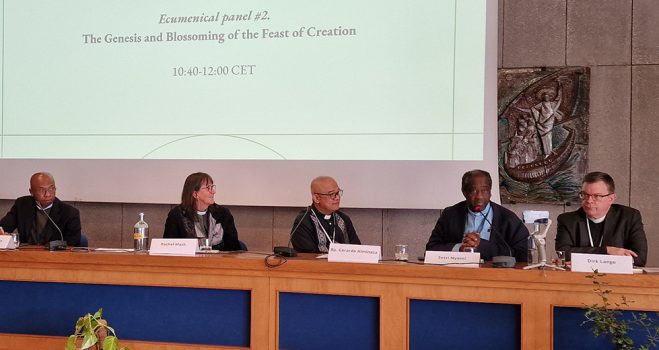“The time is far spent for us to use consultations to articulate wonderful coherent thoughts on creation. Proclaiming a Day of Creation, a Feast of Creation is only one small step. Using it as a call for faith-based action is the more important calling we have,” concluded Setri Nyomi, interim general secretary of the World Communion of Reformed Churches (WCRC), during a presentation at the Feast of Creation and Mystery of Creation conference, being held in Assisi, Italy, 15-16 March 2024.
Nyomi, speaking on an ecuemical panel titled “The genesis and blossoming of the Feast of Creation,” said that the WCRC’s commitment to creation care is based on Scripture.
“Human beings were rather called to stewardship which includes enjoying and living in harmony with other creation of God. The fall distorted all that,” he said. “But we have seen an astronomic increase in this distortion mainly in the last two centuries, where influenced by corrupt social and economic forces, there has been such a blatant disrespect of other creation, leading to the climate injustice we now see and the march towards self-destruction.”
He noted that 500 years ago “John Calvin had much to say about our care for the environment,” citing several passages from a sermon the Reformer preached:
Today, such cruelty is even greater among those who call themselves Christians … For today they go about scorching and burning the land which is worse than cutting throats … Human beings have distanced themselves from God and become brutish as a result.
Let us therefore take care not to uproot any fruit trees, but since the Word of God is the seed of life, let us endeavour to scatter it widely, so that it can put down strong roots and produce a tree that is not unfruitful, but one that produces much fruit. God has chosen us for His people and here God shows us a justice that must permeate our whole lives.
Nyomi then noted the WCRC’s current commitment to climate justice, articulated in the Accra Confession: “With our long-standing commitment to justice, we do not separate economic justice and climate justice. In the Accra Confession that link is clear at several places. In Paragraph 5, we noted: ‘We have heard that creation continues to groan, in bondage, waiting for its liberation (Romans 8:22). We are challenged by the cries of the people who suffer and by the woundedness of creation itself. We see a dramatic convergence between the suffering of the people and the damage done to the rest of creation.’”
“We are constantly calling on our member churches to make this commitment an integral part of the mission to which we have been called,” he said.
Other members of the panel included representatives from the Anglican Communion, Conference of European Churches, Lutheran World Federation, Roman Catholic Church, World Council of Churches, and World Methodist Council.
Participants at the conference gathered from around the world. Other members of the WCRC included Hanns Lessing, executive secretaery for communion and theology; Philip Vinod Peacock, executive secretary for justice and witness; Ernst Conradie of the University of the Western Cape (South Africa), and Claudio Carvalhaes of Union Theological Seminary (New York City).
The conference was hosted by the Laudato Si’ Action Platform, a shared space where the Church develops a bold and active response to the ecological crisis, so urgently illustrated in Pope Francis’ encyclical Laudato Si’.
The justice work of the WCRC is supported by the Council for World Mission Otto per Mille.


